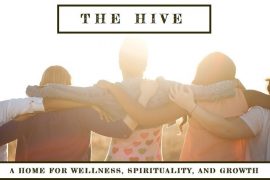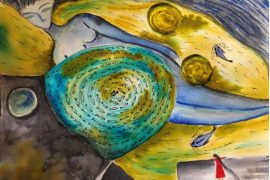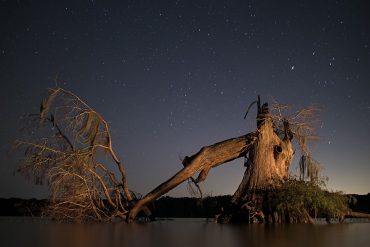Li-Young Lee was born in Jakarta, Indonesia to parents who were, as he discusses in this interview, scapegoated by the Chinese government and forced into exile. They were soon driven out of Indonesia as well, eventually ending up in Pennsylvania, where Lee’s father became a Presbyterian minister. In five collections of poems, including the Lamont Poetry Selection, The City in Which I Love You, and last year’s The Undressing, as well as a memoir, The Winged Seed, Lee documents the progress of a soul (his) toward Love. His work has attracted readers drawn to the mystical and illuminating sense of the Divine moving through powerful poems such as “The Cleaving,” in which he writes: ‘Was it me in the Other/I prayed to when I prayed?’ In another interview, Lee describes poems as being ‘descendants of God.’ Here he talks to Shao Wei and Jason Myers and explores those descensions and ascensions that make up his days and nights.
EcoTheo: What are your current practices that might fall under the definition of spiritual or religious? How essential are these to your creative practice?
Li-Young Lee: I write daily. I meditate daily. I contemplate daily. I practice Taiji daily. I pray for illumination and guidance daily. I find these essential to my life. Let me take a moment here and say a few words about what the Chinese call The Taiji Principle, that principle they define as the dynamism of opposites. Practitioners of Taiji believe that it is precisely this principle which underlies all manifestations — material, spiritual, mental, and psychological — and that the study and practice of Taiji is the study and practice of the polarities of yin and yang in their different stages of separation and reconciliation. Now, interestingly, Heraclitus also believed in such a founding principle, which he called The Logos, and which he defined as the strife and harmony of opposites which underlies all reality. It is this very Logos which the writer of the Gospel of John referred to as The Word, which is the founding principle of all things. So the practice of Taiji is essentially an embodied practice of The Logos, and I find such practice powerfully revelatory as a path to understanding ultimate reality, or God. I’d also like to point out that at this moment in history when we are witnessing division and escalation to extremes, whether between men and women, left wing and right wing, East and West, or rich and poor, the understanding of The Logos, The Taiji Principle, has never been more important, and any ignorance of the true significance of this Logic, consigning what is a principle and logic of the separation and reconciliation of opposites to a merely male idea or only a physical activity that yields health benefits for senior citizens, is regrettable.
EcoTheo: In “Changing Places in the Fire” you write ‘I sang/in a church choir during one war/North American TV made famous.’ Do you still sing in a church choir? Do you consider worship, or singing as part of a spiritual community, to be an act of resistance?
Li-Young Lee: I no longer sing in a church choir. I consider worship or any other spiritual practice as fundamentally orienting, compass-like, pointing the soul toward its primal source and its most meaningful destiny. If such orientation, if aiming at knowledge of God, has the tertiary result or collateral effect of resistance to the latest ideology or political slogan, the latest academic fad, the most recent intellectual fashion trend, etc., so be it. I’ve no issue with that. But personal experience leads me to believe that the practice of worship or singing or poetry for the primary purpose of resistance is to define such practice in terms of the object of resistance, and not the object of adoration. Such practice places the object of resistance at the heart of the matter, and that shift of aim from God’s or Love’s inmost heart to some object of resistance must lead eventually to confusion or disaster for the one practicing. I consider that a form of dis-orientation, rather than orientation. And let’s keep in mind the word ‘orientation’ comes from ‘orient’, where the sun rises. Any practice aimed anywhere else other than where the light is born is not an orienting practice, it seems to me.
EcoTheo: What role do you think religious communities have/should have in political discourse? In response to war and other man-made tragedies and disasters?
Li-Young Lee: I think Jesus Christ, The Buddha, and Lao Dze all defied every call and plea from those around them to become political actors. If politics is war conducted by other means, which I more and more believe to be true, then to ask a religious person to participate in politics would be to ask that person to engage in war and the practice of violence. And yet, one of the revolutionary injunctions of any cult of Love, which I believe Christianity, Daoism, and Buddhism to be, is to relinquish violence. Aren’t all states and policies of state maintained by violence, after all? Aren’t all laws maintained by use of force and threats of violence? Which leads me to wonder what kind of citizenry would make it possible, what level of evolution must our species have achieved, in order to create a state maintained by love, good will, and visionary wisdom? Would that be the only possible New Jerusalem?
But let me say something else in regards to politics. For me, the smallest, seemingly most insignificant individual person exists and has value beyond the definitions of any demography, any group, even any community invented by any human power. Political perspectives always reduce a complex, multi-valent human individual to a generality, a member of a group. Political perspectives of personhood usually require a reduction of the mystery and complexity of a human being to the single dimension of group identity. Most, if not all political discourse proceeds along lines of group identity. But I’m interested in poetry as a way to reveal or discover more comprehensive definitions of essential human nature. Thinking of persons as members of a group never arrives at comprehensive or essential enough definitions for me. More complete definitions would necessarily include the socio-political dimension, of course, but they would also include the personal, and the psychological, and the metaphysical, each of these orientations in turn corresponding to what I’ve imagined to be, at the risk of over-simplification, a public self (the face and voice we unfold to strangers), a private self (the face and voice we unfold to our intimates), a secret self (the face and voice we unfold to ourselves), and an unknown self (the face and voice we only sometimes glimpse or overhear when the previous three orientations are abandoned or in recession). It’s possible that my having been the victim of inadequate definitions of the human and the violence that such poor definitions engender, definitions which are less than comprehensive and derived from non-essential terms, has moved me to seek out more comprehensive definitions of the essentially human.
In answer to the second part of your question, “Love thy neighbor” comes to mind. “Forgive 7×7 fold” comes to mind. “Love thy neighbor,” comes to mind again. Yes, love thy neighbor.
EcoTheo: How do you think about the word ‘home’? What are the topographies that reside in your imagination, your body?
Li-Young Lee: ‘Home’, like any word, is subject to a paradox all words seem subject to, a paradox I find interesting for a number of reasons, including its correspondence to certain principles of yin and yang. The logic of that paradox goes something like this: the fewer definitions a word has, the more definition it commands, the more defined that word is, and the less likelihood that crisis surrounds the meanings attributed to that word. But also the less likelihood that subtleties and potentialities might congregate about that word. On the other hand, the more definitions a word has, the less defined that word is, the less definition that word secures and, subsequently, the greater the number of possible meanings that accrue to that word, the greater the number of subtleties and potentialities that buzz about that word, and the greater the likelihood that crisis attends that word. Of course, I’m thinking in general, and about a word in isolation, and these conditions are mediated by context and use, by a word’s entering into relationship with other words. It turns out, for me, the word ‘home’ is not very well defined by a country or place or any particular structure, and therefore that word is the site of immense subtlety, potency, and crisis for me.
Maybe it is so for everyone, but I wouldn’t know. The fact is, my siblings and I basically grew up knowing that our parents were completely unable to protect us from harm. Whatever ‘home’ they might have provided for us, God bless them, was completely vulnerable to spontaneous, wanton, and unjustified violence, from which we had no legal or other forms of protections. You see, I was born to scapegoats. My mother and father and the families they came from were violently scapegoated in China, where my parents were born. After escaping China, my parents started a family from scratch in Jakarta, Indonesia, where I was born, and where my parents found themselves to be the open targets of violent scapegoating yet again, this time with their own children at hazard.
After escaping Indonesia and finally arriving as refugees in the United States, a country at war at that time with an Asian country, we were scapegoated here, in less murderously violent ways, but still undeniably subjected to that particular practice of victimage from which my parents, being themselves victims, could in no way shield us. So, what might ‘home’ mean in such circumstances? Neither safety nor security. And certainly not membership that confers privileges or protections or sanctuary. I think that anyone who hasn’t experienced being scapegoated would have no inkling of what I’m talking about. And yet, when I look at the world we live in today, I see that my family and I don’t constitute a special case, but are standard and the majority.
Globally speaking, all I see is the sign of the scapegoat. There are scapegoats everywhere on this planet. We live under the sign of the scapegoat, everyone scapegoating everyone. What can ‘home’ mean to anyone these days except crisis? Our earth-home itself is suffering massive crisis. Maybe the word ‘home’ is more important than ever to contemplate. But I can’t seem to get my head around it.
EcoTheo: In your poem “From Blossoms” you write about moving ‘from joy to joy to joy.’ What brings you joy these days?
Li-Young Lee: My wife. My children. Friends. Books. Trees. Birds. Flowers. Bugs. Mushrooms. Taiji. Food. Music. Sleep. Dreams. Writing. Time. Rain. Sunshine. Dawn. Dusk. Stars. Solitude. Being in a body. Thinking about God.
EcoTheo: What brings you anguish, anger, dread?
Li-Young Lee: Ignorance of God. Not fulfilling my mission. I feel I’m an arrow loosed from The Hand of God, but I fear missing the target. Maybe the wood I was carved from was crooked, or wormy, or has too many knots, or wasn’t weighted or fletched right.
EcoTheo: Many of your poems have a longer, often serial form. Why do you think you’re drawn to the long poem? When do you know what length a poem will be? Is a poem finished or abandoned?
Li-Young Lee: Well, we know that light is both a wave and a particle. I think of long poems as a way to study and think about the wave function of the soul, while short poems are a way to understand the particle-manifestation of the soul. I never know what length a poem will be. Long poems grow and accrue their lines and stanzas around some center of gravity that seems to increase naturally. For me, poems are abandoned before they’re finished.
EcoTheo: If you were writing letters to a young poet, what would you want to tell her?
Li-Young Lee: I’d tell her to read Rilke’s “Letters to a Young Poet” and, if at all possible, keep her contact with academia and the business side of publishing to a minimum. Business, like politics, is war conducted by other means, and academia is a business. And while one cannot altogether avoid academia or the publishing world in this day and age, one can try to be in those worlds without being of those worlds.
EcoTheo: In your memoir, The Winged Seed: A Remembrance, your father became one of the first Chinese American pastors serving a displaced community in this country. How did his religion become yours?
Li-Young Lee: My father was a member of a cult of Love, Christianity. I spent years straw-manning it in debates with my father while he was alive, and even after he died. I eventually understood that Love is the most simple and rigorous path any person could embrace. I embrace it now, but I’m a poor lover, my passion intense but unstable, childish, wayward, characterized by confusion, petulance, ego-gratification, you name it.
EcoTheo: How have faith and love of God shaped you as a writer?
Li-Young Lee: I don’t have faith that God exists, since I experience God enough to know that God exists, haunting both my inner and outer worlds. But I sometimes have to remember that God’s Logic is not my logic. I keep forgetting that the Logos of God, otherwise named The Dao, is not the logos or dao of human beings. For that matter, for me, a poem must, first and foremost, possess spiritual authority, not just temporal power. In other words, a poem must reveal a logic beyond human logic. In fact, for me, among all the temporal power structures invented by human beings, the state included, a poem is one which must play host to something beyond the human. Unless a poem speaks to my spirit, I find it a noisy cymbal.
EcoTheo: Do you think that poetry can be a form of religion, too, another form of Word?
Li-Young Lee: I do, and I once believed that poetry was synonymous with The Word, that the practice of poetry was nothing less than the practice of The Logos, that the logic of poetry was the Logic of God. But while I still feel that poetry can become a form of religion, I don’t feel it is a true religion, marked as it is by obsession, personal ambition, competitiveness, rivalry, and other symptoms of enslavement, while a true religion is characterized by liberation. One could practice poetry as a practice of The Word, The Dao or Logic of God, a practice of The Word made Flesh, but I see now that one could also religiously practice poetry as a practice of words, the practice of words- made-more-words. Poetry, I’ve come to see, is not necessarily, in and of itself, the highest or deepest or most meaningful destiny of words. A poem might possibly be that, but not inevitably. Meanwhile, I’m interested in the most meaningful and deepest destiny of language, and I don’t believe such a destiny lies in more language. A poem that inspires others to write poems, a poem that gives rise to hundreds, even thousands of other poems is a poor second to a poem, or any work of art, that inspires even one person to change his or her life to turn toward greater meaning, or the quest for greater meaning.
EcoTheo: If you had to describe your poetry in just a few words, what would they be?
Li-Young Lee: Meh. But I did my best.





